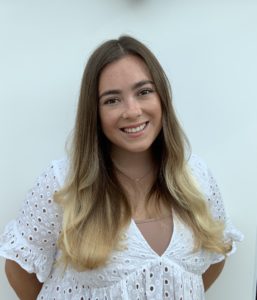Liv graduated from Bath from the MSc Applied Psychology and Economic Behaviour course in 2020 and currently works as a Behavioural Science Consultant. Below she tells us about her own careers story and shares tips and advice about how to get into this exciting industry.
Can you tell me a little about yourself and where you work?
So, I completed my postgraduate degree from Bath in in December 2020 and I currently work as a Behavioural Science Consultant for Influence At Work. I started my current role whilst I was already studying back in May 2020, working part-time alongside completing my theses, before going full-time in September.
Influence At Work is a small behavioural science consultancy, however despite our size we work with really impressive and international clients. As we are a small company, I’m really lucky to have the opportunity to work across lots of different sectors, for example one day I will be working on projects in the utility space e.g., researching how energy customers can be influenced to submit meter readings on time, and the next I am working on projects in the international conservation space, such as using behavioural science to promote environmental farming practices in Vietnam. I find the international social mobilisation and conservation work particularly interesting and I have learnt a lot about cross-cultural communication from working with small international charities.
How did you hear about and apply to your role?
I found my current role through LinkedIn. I really didn’t think that I would get it as it was really competitive and there were hundreds of applicants. I initially applied with a CV and a Cover Letter and I was then invited to complete two applied tasks; the first one was all about optimising communications and the second was an applied behaviour change challenge to assess how I would approach the issue. After I got through this round, I was invited to an initial interview with two of my now colleagues, and the final stage was an interview with our CEO Steve Martin.
I appreciate that it can be tricky to get into behavioural science roles as a recent graduate, because entry-level roles are few and far between. I found LinkedIn to be a really good tool for job adverts and job alerts, and also a place to connect with relevant people and to follow relevant companies. The behavioural science community is really small and therefore connecting and networking with people in the industry is vital if you want to learn more about organisations and job opportunities. I experienced this first hand, before my current role I successfully applied for a behavioural science internship at another consultancy, and I only heard about this internship through someone in the industry I had previously connected with.
What were the challenges you faced applying to jobs while studying for your Masters?
Applying for jobs whilst studying and against the backdrop of an emerging global pandemic was difficult, the job market was and still is uncertain, and I found that a few companies just ghosted me, even when I had reached the final stages of the application process. Also, when you are not looking to apply to the classic ‘big grad schemes’, actually finding job opportunities in smaller or more emerging industries like behavioural science can be really hard. I found that reaching out and talking to people in the industry was the best way of hearing about opportunities.
What are the reasons you think you were successful in finding your current job?
- Networking and talking to people!
- Having relevant work experience. Having a relevant internship increased my chances of finding a job and gave me something different to talk about in my interview.
- Being aware that jobs are not widely advertised, and knowing where to look.
- Reading behavioural science newsletters and checking their job boards, especially Habit Weekly and The Behavioural Scientist
- Both my Psychology undergraduate degree and my postgraduate degree gave me a solid foundation in data analysis, experimental design, SPSS Statistics and R.
What are your tips for students wanting to find jobs in behavioural science?
- Network and connect with the right people! Be prepared to be rejected and ignored but stick with it.
- Follow companies you think you’d like to work for on LinkedIn so you see job postings.
- Ask for work experience and try and find internships wherever you can, even if they are not advertised. Some consultancies do work experience (food and travel paid for) or summer school experiences.
- Optimize your CV using behavioural science principles. Behaviourally optimising communications is an important part of my role, use your CV to showcase your applied behavioural science skills!
- Be interested! Do extra reading and know of quirky or interesting studies, it will make you stand out in the application process!
- Be yourself! Even though your experience and academic background are both important, many small companies want to know you can fit in with the team, so personality and company-fit is really important in an interview
The Careers Service thanks Liv for this interview 😊
Respond

